No Dogs Left Behind: Rescuing Dogs from the Meat Trade
The nonprofit organization rescues and rehabilitates dogs from the global meat trade. Here’s how and why they do it.
The nonprofit organization rescues and rehabilitates dogs from the global meat trade. Here’s how and why they do it.
by Cammi Morgan, | May 29, 2024

For thousands of years, dogs have been domesticated in one way or another: working, hunting, and living alongside us. But by the late 20th century, humans viewed them more as family members and, as such, became invested in animal welfare. So, for many people across the world, the idea of eating dog meat has now become profoundly unsettling. Still, efforts to ban dog meat have been slow: Even in the United States, the Dog and Cat Meat Trade Prohibition Act only passed in late 2018.
The consumption of canine meat also has a history that spans centuries and the globe: from the pre-classical era, where certain South American populations consumed it for survival or ceremony, to 20th-century Europe, where dog meat was consumed during times of economic strife. Today, there are still pockets of people who consume this meat, and groups such as No Dogs Left Behind are devoted to ending this practice.
Although China and South Korea tend to be focal points for animal activists, both countries have several bans in place. South Korea recently passed a dog-meat ban. Some parts of China have banned it, too — with many vocal citizens protesting the spots where it is legal. Hong Kong, Taiwan, Thailand, and Singapore also have bans in place.
The Humane Society characterized the above as a paradigm shift across Asia. This change has been driven by a mix of dogs being recognized as “companion animals” (as China’s Ministry of Agriculture recently put it), a reaction to the cruel conditions they’re bred in, and public health concerns that dog meat can spread disease to humans.
Unfortunately, some people have continued to slaughter dogs despite these changing laws and the risks to public health. To that end, No Dogs Left Behind partners with a network of local activists to help legally stop the dog-meat trade across East Asia. Below, we detail how the organization manages to rescue and adopt-out these dogs, as well as suggestions for how you can help, too.
No Dogs Left Behind is a nonprofit organization that rescues dogs from the East Asian meat trade. Through strategic partnerships with local activists and other grassroots efforts, they provide shelter, medical care, and adoption services for these animals. Most of these rescued dogs are then fostered or adopted by families throughout the U.S., U.K., and Canada.
While the No Dogs Left Behind dog rescue frequently focuses on saving dogs from the Chinese and South Korean meat trade (within the parameters of laws there, of course), their greater mission is actually broader and “extends beyond borders worldwide, advocating for the creation and enforcement of animal welfare laws.”
No Dogs Left Behind works directly in rescuing and rehabilitating meat-trade dogs. They then place them in foster and adoptive homes, educate the public about animal welfare, and advocate for animal protection laws. They use a five-pillar approach to achieve this:
1. Emergency response: By coordinating with boots-on-the-ground local activists, No Dogs Left Behind can rescue dogs from meat-trade operations across East Asia without purchasing the dogs. In doing so, they avoid giving money to butchers and traders, who’d use those funds to grow their dog-meat businesses.
2. Shelter operations: Once the rescued and quarantined dogs are vaccinated against infectious diseases and dewormed, they are transported to one of the No Dogs Left Behind sanctuary locations for further care and rehabilitation. Dogs who need additional medical care are taken to the sanctuary’s clinic area, while healthier dogs are housed together to begin socialization — an emphasis is put on helping these rescued pups feel comfortable around people — and other adoption preparations.
3. Education: No Dogs Left Behind works with the Chinese Agricultural College and Harrow International School Beijing to introduce students to animal welfare education. In the U.S., No Dogs Left Behind has a Junior Board of Directors comprised of high school students, who learn how to engage within various aspects of the organization’s leadership. No Dogs Left Behind also helps workers within the dog-meat trade leave the industry and find alternative employment.
4. Government advocacy: No Dogs Left Behind is working to expand their lobbying power to push for greater protection of animals worldwide. “While the Dog and Cat Meat Trade Prohibition Act of 2018 prohibits the consumption of dog and cat meat in the United States,” says Jeffrey Beri, No Dogs Left Behind’s founder, “there are still more animal welfare laws that need to be enacted for all animals, not just dogs.”
5. Adoption: Securing safe and loving homes for the survivors of the dog-meat industry is central to the rescue’s work. To date, No Dogs Left Behind has rescued thousands of dogs from the dog-meat trade and placed them into loving homes.
According to the Humane Society International, the dog-meat trade exists primarily across parts of China, South Korea, Indonesia, and Vietnam. The Humane Society International estimates that about 30 million dogs are killed each year for human consumption. In South Korea, where a national ban will go into effect in 2027, dogs have been bred in large, factory-farm conditions, crammed into tiny cages and often killed via torturous methods.
Some of these dogs die in cages or during transport from dehydration, starvation, injuries, and illness. Those who survive suffer horribly in appalling conditions before being killed. Traders round up street dogs and even snatch family dogs, who are packed into transport trucks. According to the Asia Canine Protection Alliance, the highly unsanitary dog meat trade poses a significant risk of the transmission of infectious diseases that can pass from sick dogs to humans, such as cholera and rabies. This is one of the driving forces behind a growing trend of cities across China banning the dog meat trade.
Local and international activists across multiple organizations, including No Dogs Left Behind, work year-round to end the dog-meat trade. Each June, the Yulin province of China hosts the Lychee and Dog Meat Festival for which tens of thousands of dogs are killed for consumption, often trucked in without the necessary health certificates. Part of the work of No Dogs Left Behind is rescuing as many dogs as they can en route to this festival.
No Dogs Left Behind works within a coordinated network of local, regional, and international activists across China and South Korea to rescue dogs from the meat trade, rehabilitate them, and place them in loving homes. This work involves intel gathering, consistent communication, and brave action.
The tides are beginning to turn in favor of animal welfare in China as four mainland cities, Zhuhai, Shenzhen, Beijing, and Wuhan all banned the sale and consumption of dog meat in the spring of 2020.
But in other places without a ban, No Dogs Left Behind intercepts trucks bound for slaughterhouses, including those headed to the Lychee and Dog Meat Festival in Yulin. The dogs are never bought, Beri notes, because “purchasing a dog kills 10 more.” Instead, No Dogs Left Behind allies demand that truckers provide proper legal documentation for each dog, including health and quarantine certificates, which they typically don’t have. Because the fines set forth by the Chinese Ministry of Agriculture and Rural Affairs would exceed the profits they’d make off the dogs, the traffickers eventually surrender the animals to activists.
“The dogs are just so badly beaten, tortured, slammed into chicken cages,” says Beri. He believes educating children about why dogs are our friends is the key to change. He often speaks at schools in Yulin to teach students about compassion and kindness towards dogs.
On January 9, 2024, South Korea’s National Assembly passed a special bill outlawing the breeding, slaughter, and selling of dogs for human consumption. The government is allowing a three-year grace period for those involved in the dog-meat trade to find alternate livelihoods. In the meantime, No Dogs Left Behind has been vocally supporting South Korean-based animal rights organizations and helping where it can to facilitate paths to adoption.
No Dogs Left Behind currently has three dog sanctuary sites in Asia, all in China (in Beijing, Dayi, and Gongyi). Here, canine survivors recover, receive medical care, learn socialization skills, and prepare for adoption. Their newest facility is the Beijing location, which houses about 200 dogs and features indoor and outdoor housing, and plenty of space for play and socialization.
Once rescued, the dogs arrive at a secure quarantine area to receive immediate medical care, including exams, treatment of injuries, deworming, and vaccinations. After they are cleared for transport, the dogs arrive at one of the sanctuary locations, where they begin their journey of rehabilitation.
Volunteers and staff work daily with the dogs to help them feel safe and comfortable around humans. Gentle handling, patience, compassion, and relationship building are crucial to this process. For those placed into foster and adoptive homes, this gentle building of trust continues as the dogs begin their lives as family members.
No Dogs Left Behind’s rescue operations and animal shelters rely on volunteers and supporters. Donating, volunteering, adopting, and fostering are ways you can get involved in No Dogs Left Behind’s mission.
Donations are critical to support the work of No Dogs Left Behind. The funding supports their dog sanctuary, clinic, rescue missions, educational programs, transport, and more. Because the org is a 501(c)(3), your donation is tax-exempt. Additionally, you can sign petitions, join protests and events in support of animal welfare, fundraise, and share the work of No Dogs Left Behind (and other organizations working to end the dog-meat trade) on social media.
When you adopt a dog through No Dogs Left Behind, your adoption fee goes directly toward saving others from slaughter. If you’re interested in dog adoption, you can browse available dogs on Adopt a Pet and apply to adopt them.
Yes, No Dogs Left Behind is a 501(c)(3) nonprofit rescue organization with a Gold Transparency rating from GuideStar.
Yes, No Dogs Left Behind’s dogs are available for adoption. Their adoption fees are much higher than domestic adoption costs due to the added costs of international transport and obtaining health certificates.
To date, No Dogs Left Behind has saved thousands of dogs through direct rescue, providing medical care, and finding loving homes for these canine survivors.
Asia Canine Protection Alliance
An Emerging Social Movement in China: Frames and Activists in Dog-Rescue Actions

Cammi Morgan is a nature and pet care writer living off-grid with her pack of rescue and foster dogs in the mountains of Southeast Appalachia. In addition to her work with Adopt a Pet, she has contributed to Animal Wellness Magazine, PetsRadar, Global Comment, A-Z Animals and other online publications. Her passions include animal rescue, mycology, hiking, and caving.
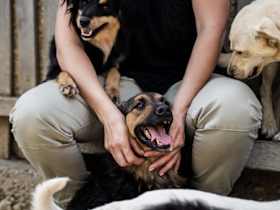
Shelters & Rescue
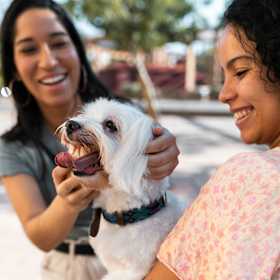
Shelters & Rescue
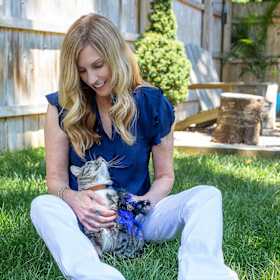
Shelters & Rescue
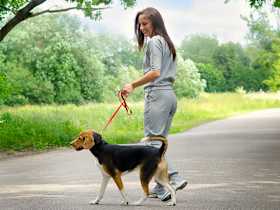
Shelters & Rescue
Daily walks are crucial for pets, especially for shelter dogs waiting for adoption. Learn how you can become a volunteer dog walker with these helpful tips.
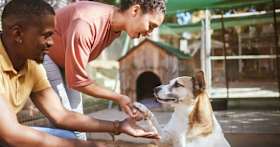
Shelters & Rescue
Looking to adopt? Here are some helpful guidelines on finding a reputable pet rescue organization.
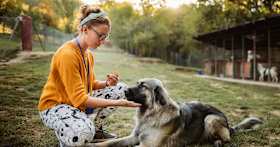
Shelters & Rescue
Looking to adopt, but not sure which type of pet adoption organization is right for you? This guide is here to help.

Shelters & Rescue
Looking to adopt from a shelter? This guide will help you familiarize yourself with common shelter terminology about both the adoption process and pet profiles.

Shelters & Rescue
Here’s how to make an effective lost dog poster — whether your pet is missing or you found a stray pup — and increase the chances of a safe homecoming
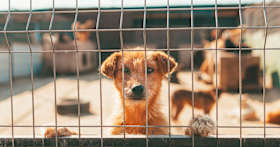
Shelters & Rescue
Read on for the grim statistics and hopeful solutions to this national problem plaguing shelters and rescues alike
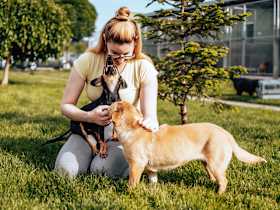
Shelters & Rescue
If you’re in search of a pup with a big personality in an adorably small package, you’ve come to the right place.
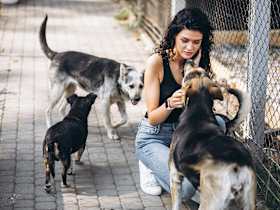
Shelters & Rescue
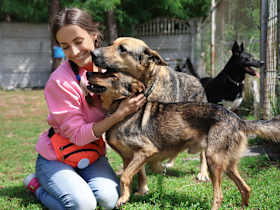
Shelters & Rescue
Debunk a few animal shelter myths and learn the benefits of adopting from a shelter or rescue group.